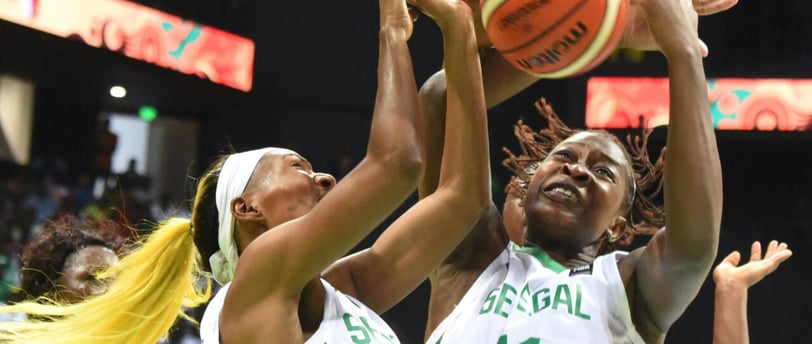Visa Denied: Senegal Women's Team Turned Upside Down Ahead of AfroBasket
US preparation canceled and BLEUES reorganized for continental tournament.
BASKETBALL
By Emmanuel Louis
6/26/20257 min read


Introduction to the Senegal Women's Basketball Team's Challenges
The Senegal women’s basketball team has established itself as a prominent contender in African basketball, known for its skill, resilience, and strategic gameplay. However, recent developments have thrust the squad into an unexpected predicament, as their journey to the upcoming AfroBasket championship has been significantly hindered by visa complications. The denied visas have thrown a wrench into their meticulous preparations, jeopardizing their aspirations for success at the tournament.
The importance of the training camp in the United States cannot be overstated. It was intended to serve as a critical phase where the team would refine their skills, build camaraderie, and integrate new strategies under the guidance of their coaching staff. Such camps are essential for international teams, allowing for exposure to diverse playstyles and intensive competition. The Senegal women’s basketball team was particularly looking forward to this opportunity, as it offered a platform to enhance their performance ahead of a highly competitive AfroBasket. The training camp was designed not only to strengthen their technical capabilities but also to foster team spirit, crucial for success against other strong contenders.
The Visa Denial Incident Explained
The recent visa denial incident has posed significant challenges for the Senegal Women’s Basketball Team as they prepared for the prestigious AfroBasket tournament. On the eve of their planned travel, Prime Minister Ousmane Sonko made an alarming announcement regarding the team’s visa status, revealing that a total of 15 members had been denied their visas. This unexpected news has led to considerable disruption, both within the team and in the broader sporting community, creating uncertainty about their participation in the upcoming competition.
As investigations into the circumstances surrounding the visa denials unfolded, various factors were examined. Preliminary insights suggest that administrative complications and the potential for insufficient documentation may have influenced the decision made by the visa issuing authorities. There are also indications of increasing scrutiny related to sports teams traveling for major international events. As such, the Senegal Women’s Team has found itself at the center of a broader conversation regarding athletes' mobility and international relations, particularly how bureaucratic hurdles can impact promotions and participations in sports.
This incident highlights the urgent need for improved coordination between sporting federations and governmental agencies to ensure that athletes have the appropriate support and clear communication surrounding visa applications, thereby preventing disruptions in the future. The repercussions of this situation will likely extend beyond the immediate tournament, influencing policies and procedures for international sports teams in Senegal moving forward.
Impact on Training and Team Preparedness
The cancellation of the U.S. training camp due to visa issues has significantly influenced the Senegal Women's Team's preparedness for the upcoming AfroBasket tournament. Originally, the team had planned to leverage the high-quality training facilities and competitive environment in the United States to enhance their performance. The abrupt change in plans has necessitated a swift adaptation to alternative training arrangements, which may not provide the same level of intensity or experience as originally intended.
Training in a familiar setting can occasionally lead to complacency, as players are accustomed to their surroundings and routines. However, the shift back to local training presents both challenges and opportunities. While local facilities may lack the advanced resources found in U.S. camps, the team must swiftly recalibrate and refocus their strategies to optimize their performance. The coaching staff will play a crucial role in tailoring training regimens that maintain the team’s competitiveness while working with the resources available at home.
Furthermore, the nature of competition at an international event like AfroBasket demands a level of preparedness that is often cultivated in diverse environments. Training abroad allows teams to experience and adopt various playing styles, which is invaluable against diverse opponents. The psychological readiness that stems from competing in different cultural and competitive contexts may be lacking as the Senegal Women's Team adjusts to local training routines.
This situation underscores the significance of adaptability in sports. While the team faces hurdles related to training environments, their ability to unite and rally during this period will be paramount. The real test lies in transforming potential setbacks from the cancelled camp into an impetus for growth and resilience as they approach the AfroBasket tournament.
Reorganization of Training in Dakar
In light of the recent visa situation impacting the Senegal women’s basketball team, a comprehensive reorganization of their training regimen in Dakar has become imperative. With the initial travel plans thwarted, the coaching staff has swiftly adapted their approach to ensure that players remain focused and prepared for the upcoming AfroBasket tournament. They are leveraging local facilities and resources to create a training environment that is both dynamic and conducive to the team’s needs.
The new training schedule has been meticulously crafted to maximize efficiency while accommodating the emotional and psychological aspects of the visa setback. Practices have been intensified, incorporating not just technical drills but also tactical sessions that enable players to work collaboratively in strategizing plays. These adjustments came after discussions with players to determine the most effective ways to maintain a competitive edge in the absence of international exposure.
Moreover, the coaching staff has emphasized a holistic approach to training by integrating physical conditioning, mental wellness sessions, and team-building activities. Access to local gyms and sports science resources has provided the team with the necessary tools to enhance their athletic performance. The players have begun to utilize these facilities, focusing on their agility, endurance, and strength, which are essential for competing at a high level against formidable opponents.
Despite the challenges presented by the visa denial, the Senegal women's basketball team is responding with resilience and determination. The reorganization of training in Dakar has created an opportunity for the team to build unity and enhance their skills collaboratively. By focusing on what they can control, the players are cultivating a steadfast spirit and preparing to represent their nation with pride when the tournament commences.
Emotional and Psychological Effects on the Team
The recent visa denial faced by the Senegal Women's National Basketball Team has precipitated a wave of emotional and psychological distress among players and coaching staff alike. As the team prepared for the high-stakes competition of AfroBasket, the news of their visa restrictions shattered not only their travel plans but also their spirits. Athletes, who invest countless hours into rigorous training and teamwork, often find their mental health and self-esteem intertwined with their ability to participate in international competitions.
The impact of this ordeal on team morale can be profound. Players may experience feelings of frustration, disbelief, and anxiety as they grapple with the uncertainty surrounding their participation. This emotional turmoil can hinder their focus and performance in training sessions leading up to the tournament. The mental strain does not solely rest with the athletes; coaching staff also bears a significant burden as they strive to maintain a sense of composure and unity within the group. Coaches often serve as pillars of support, but when faced with such adversity, their own feelings of helplessness may surface, making it challenging to inspire confidence in their players.
Moreover, the psychological ramifications of not being able to compete can lead to issues like decreased motivation and a lack of cohesion within the team. It is critical to acknowledge that basketball is not just a physical sport; it demands a strong mental fortitude. As players express their disappointment, some have reported feelings of isolation and vulnerability, worrying that the denial reflects broader issues of recognition and respect on the international stage.
In light of these challenges, it is crucial for the Senegal Women's Team to leverage available mental health resources. Engaging with sports psychologists or counselors can provide essential support and help navigate the emotional challenges that arise from such incidents. Listening to the players' narratives in the wake of this setback reveals the depth of their passion for the game, emphasizing that their resilience will be vital as they move forward.
Broader Implications for Sports Teams and International Travel
The recent visa denial faced by the Senegal Women’s Basketball Team in the lead-up to AfroBasket serves as a poignant reminder of the complex and often challenging nature of international travel in sports. For many teams, especially those representing their nations in significant tournaments, visa issues can have profound implications not only for the teams directly affected but also for the broader sporting community. The issue highlights the vulnerability of national teams to regulatory changes and geopolitical tensions that can arise suddenly, creating barriers to participation in critical events.
Visa-related obstacles can disrupt preparation, team cohesion, and performance, ultimately affecting the outcome of competitions. When a team is denied entry to a tournament, it not only robs athletes of their hard work and preparation but also sends shockwaves through the sports community. Such incidents may lead to increased scrutiny on the host country and its policies, with potential repercussions on how future international events are organized and facilitated. Other nations observing this scenario may reevaluate their own travel policies and eligibility criteria for athletes, impacting future sports diplomacy and cooperation.
Furthermore, these challenges have far-reaching consequences. For instance, the absence of a competitive team can diminish the event's appeal and spirit, as well as lessen the exposure and economic benefits that come with hosting international competitions. The ramifications are particularly severe as sports organizations strive for diversification and inclusion. As teams face these obstacles, it raises vital questions about fairness and equity in international sports, urging discourse on the necessity for policy reform. With the rising globalization of sports, it is critical for countries and organizations to engage in collaborative efforts to facilitate smoother travel arrangements that support teams in their pursuit of excellence.
Looking Ahead: The Team's Prospects for AfroBasket 2025
As Senegal’s women’s basketball team navigates the challenges posed by recent visa denials, their prospects for the upcoming AfroBasket 2025 tournament remain a focal point of discussion among fans and analysts. The team’s history of excellence and competitiveness in African basketball positions them as strong contenders in the next edition of the championship. Despite the current setbacks, their resilience and adaptability will play a significant role in achieving their goals.
The coaching staff will need to reevaluate their strategies in the lead-up to AfroBasket 2025. A thorough analysis of past performances, along with an incorporation of new talent, will be essential for strengthening team dynamics. Attention must be paid to the development of individual skills and overall cohesion, as these elements are crucial in a team sport such as basketball. Furthermore, the team could benefit from incorporating training camps and friendly matches, which would allow players to gain experience and build rapport ahead of the tournament.
Moreover, fostering a culture of resilience within the team is imperative. Challenges such as travel restrictions, injuries, or even unexpected defeats are part of the sporting landscape. The ability to adapt to such circumstances could very well determine the team’s performance at AfroBasket 2025. Engaging in mental conditioning and team-building exercises will aid in preparing players both physically and psychologically for the hurdles ahead.
In conclusion, the Senegal women's basketball team faces a critical juncture as they prepare for AfroBasket 2025. Their historical success serves as a backdrop for the potential future achievements. By embracing adaptability and resilience, Senegal can continue to assert its dominance in African women’s basketball, showcasing both their skill and determination on the continental stage.
